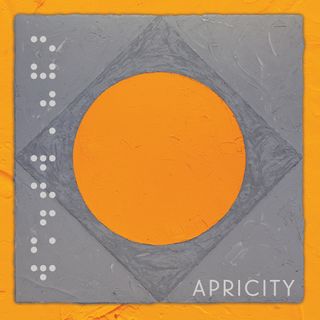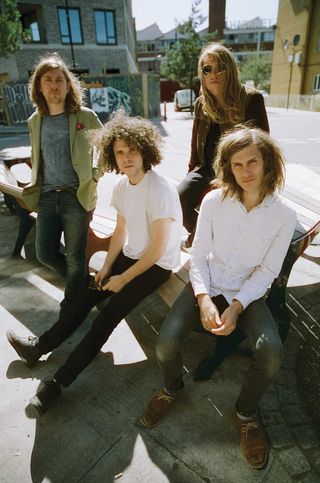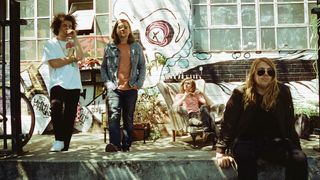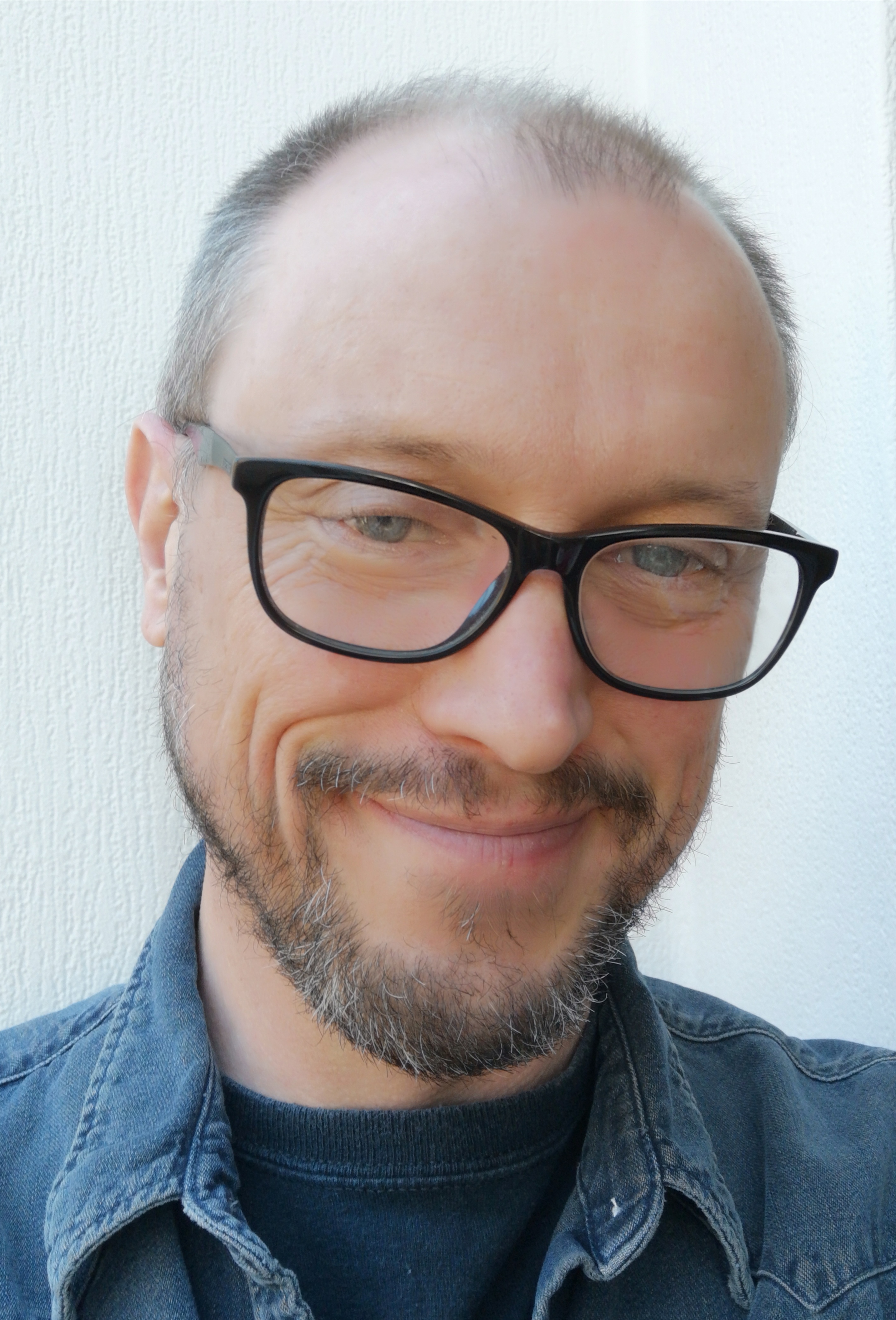Put yourself in Josh Magill’s shoes.
Back in 2014, his brothers’ band Syd Arthur were in the US, touring their name-making third album Sound Mirror, playing with Sean Lennon’s The Ghost Of A Saber Tooth Tiger. Midway through the shows, their drummer Fred Rother developed a terrible case of hyperacusis, a chronic hearing condition that renders higher sound volumes unbearably painful. This drove the poor guy out of the band, and, out of the blue, Josh was drafted in to replace him. Josh had to commit to a two-month tour, learn the set in five days, and – the kicker – he was to playin front of not hundreds, but thousands of people: the band had won the opening slot on Yes’ American tour.
“It really was a baptism of fire,” says Magill, who’s had two years to get comfy on his stool. “I’d followed the band’s progress, of course, so one element was learning the music, then another was actually performing it to 6500 people at Radio City in New York! I didn’t want to let anybody down, and that whole Yes tour was frightening until the last show, at The Greek Theatre in LA.”
Los Angeles would later become a notable pin on Syd Arthur’s world map. But for now we catch up with all four members in Detroit. The Magills (Josh, singer/guitarist Liam, bassist Joel) and keyboardist/violinist Raven Bush (his auntie is Kate) have just played the city’s Majestic Theatre, another date on their US/Canada tour opening for hip young indie minstrel Jake Bugg. Along with the clubs they’ve hit the festivals too, including one in Portland at – of all places – Oregon Zoo. “There were elephants just to the right of the stage,” says Joel Magill. “The subwoofer kicked in and their ears were going crazy. There was a volume limit, but apparently they do like the sound, they sort of dance. And right before we went on, there was a falconry display! It was weird, but cool.”

Syd Arthur have clearly been having a ball on this 20-stop adventure through the States. The jam band scene is still a thing there, and their reputation as excellent improvisers has raised their profile. Fans have turned up having caught on to them by word of mouth and online. Many more have been Jake Bugg fans ripe for conversion to the Canterbury band’s psychedelic cause. And many still come up to them to ask, in so many words, “By the way, which one’s Syd?”
According to Raven Bush – who of the four is the dominant voice in the room – “Some of them have been screaming with joy halfway through songs they don’t even know. And people go fucking crazy in the States when you take a solo. It’s so strange having teenage girls go wild when you bust out a lick. In England, they go to the bar.”
Some of those licks come from their startling new album. Apricity sees the band come good on the promise of their previous three: their self-titled debut, On An On and Sound Mirror. Building from their roots in the Canterbury psych/rave scene of the mid-noughties, their sound has evolved, losing some of its vestigial vintage airs, its folkier curlicues. Their psychedelic spirit’s been amped up and distilled into songs that feel progressive, but are also (whisper it) pretty cool and (whisper it even quieter) indie commercial. You only have to watch the retro-hued video for crafty, synth-heavy lead track Sun Rays, or listen to the highly infectious, melodically exuberant cut No Peace: Syd Arthur are a band coming into their own.
- Syd Arthur live review - Bush Hall, London
- James McArthur Collaborates With Syd Arthur's Joel Magill
- Syd Arthur's Track By Track For Apricity
- Syd Arthur - Apricity album review
In 2015, after that exhausting Sound Mirror tour and Rother’s departure, they could be found composing new music at their own Wicker Studios in Canterbury. “We’d had two years of playing around the world, on big stages,” says Bush. “Everything was stepping up, and that really informs the music you make. When you go from a club of 200 people – where everyone can hear you from just the amps and drums onstage – to playing to 6000 people, you have to make bigger gestures. It’s the difference between having a conversation with a good friend about something really obscure, to having to address a whole room full of people and unifying them.”
That change in scale can ruin some bands. With their eyes on the larger prize they can lose their muse, ditching their musical character in the scramble for arena-pleasing clichés. But while Apricity is compact, song-centric, poppy even, it’s loaded with subversive ideas reduced to a palatable concentrate. It’s the product of a band who have long been proudly self-sufficient, self-recording and self-producing. This time it’s been different.
“When our US label Harvest heard the demos,” says Joel, “they suggested we go out to LA to meet some producers and check out some studios. We’d toured with Jonathan Wilson in Europe so we messaged him and asked if we could hang out at his place. When we did it seemed like the perfect place to make the record. We were big fans of his own records so we knew what could be achieved there.”

The brilliant Wilson’s Fivestar Studios is in Echo Park, an achingly hip and newly gentrified neighbourhood of LA, akin to, say, East London or Brooklyn. Former Jellyfish member and Beck guitarist Jason Falkner had heard Syd Arthur and liked their style, and was recruited as producer. “To be honest we only knew him from his work with Beck,” says Joel. “We met him when we did Hyde Park with Beck and The Strokes in 2015. Someone with a lot under their belt won’t necessarily do a good job for you, but we met him again and there was a connection, and everyone who knew him had such good things to say about him. He’s got a golden set of ears, and he’s like a best mate now. We’ve never worked with someone else outside the band to that level of intensity. It’s been really tough spending three months with this dude all day, every day, and then having to go home.”
The band always wanted to track the album live in the studio, and had thrashed out the music to record quality prior to flying out to LA. Then for 10 days they went through the material with Falkner, who made suggestions and tweaks. Over that time some interesting albums emerged for reference: Todd Rundgren’s A Wizard, A True Star, Serge Gainsbourg’s concept album Histoire De Melody Nelson, even Scritti Politti’s 1978 EP Pre-Langue. If Apricity might not have a West Coast sound per se, those more expansive gestures learned on the road in the States are there, along perhaps with a commensurate growth in ambition.
I like to think we’re part of the spirit of what came to be called prog. We like the weird stuff before it was even called that – people who were into writing songs, but also liked jazz and extended psychedelic shit.
Crucial to the album’s sound is Liam Magill. His vocals are both stronger and sweeter than ever on Apricity. He’s taciturn during our chat though, and only really pipes up over his more loquacious bandmates when we discuss the songs. Album opener Coal Mine marries a deceptively tricky time signature with some big, catchy vocal/guitar hooks. “That’s a marriage of a tune of Raven’s and one of mine,” he says. “We fused the two, and the French stuff we listened to influenced that.”
Plane Crash In Kansas was a news headline that grabbed him, and inspired him to write a tune based on the imagery it evoked. It’s a macabre source for an off-kilter pop song, again laden with musical memes. He describes Rebel Lands as a song about “anti-terrorism, about lessening the blow of all this terrorism talk”. The album’s sole, mesmerising instrumental, Portal, was originally called Freditation and is, he says, “a little tip of the hat” to their original drummer. Equally entrancing is the echoing Evolution. “It’s based on a delay patch that’s been kicking around for years. We turned it into a song, finally, and it came out well. It’s a nice modern tune on the record. We love that one.”
No Peace and Sun Rays are the most immediate tracks. The former was one of the final additions to the album. “Liam kept saying, ‘Let’s have a pumping piano tune,’” says Raven Bush. “It’s nice to have one with that piano, and a melody on the bass. It’s got quite a simple format yet the structure of it is interesting, with an Indian violin break in there, just because we can.”
Sun Rays is oddly funky, with a spectrum-hogging keyboard sound over a cryptic, undanceable time signature. “We don’t think of that stuff,” says Bush, bluntly. “We think in phrases. When you play it on guitar, the way it falls rhythmically is really chilled. We wanted a track that was supersonic, and those fizzy synths are part of that. It’s quite simple, bare-bones chord voicing and that’s how it’s powerful. It’s treading that line of being direct and impactful without being clichéd.”
The strident title track itself is a hybrid, dating back years to a tune called Jig, which Bush wrote on violin, and a finger-picked folk tune of Liam’s called Honest Lands. Apricity is a beautiful, rarely used word. It expresses the feeling of the sun’s warmth on a cold winter’s day. That was a sensation the four kept coming back to as they recorded into November, LA’s winter sun by turns mild and strong, filtered by the canyons and trees. Bush knew the word, and it just stuck.
Back home in their own county of Kent, they were again in total control and in their own environment. Joel mixed the album, with veteran engineer John Davis mastering the final work at Metropolis Studios in early March. “Sound Mirror was done a little too speedily,” says Bush. “We wanted to spend a bit more time over this one. We were aiming to release it in early summer, but we were advised against that so it’s coming out now, in the apricious part of the year.”
By the album’s October 21 release they will have supported Austin rockers White Denim and played their own headline tour in the UK, with more dates in the works for 2017. They’ll also mark the album release with a big show in their home town of Canterbury, their first there for years.
Ah, Canterbury. A place freighted with musical meaning; a byword for cosmic, jazz-inflected proggy pastures of yore. It’s so tempting to strain for connections between Prog’s Breakthrough Act of 2014 and their illustrious local forebears. Asked if they even consider themselves a prog band, all four members mumble a vaguely reluctant ‘no’. “I like to think we’re part of the spirit of what came to be called prog,” Bush offers. “We like the weird stuff before it was even called that – people who were into writing songs, but also liked jazz and extended psychedelic shit. We don’t really relate to those big prog bands. Art’s about someone baring their soul and emotions, and with a lot of prog music there’s not enough soul, the focus is more on chops. But it’s all music, isn’t it? We like to compartmentalise things too much as human beings. There’s lot that goes into our music – we’re all into so much different stuff.”
He’s right on all counts, of course. The band’s own history has been fittingly pluralistic – the tours with Yes and Jake Bugg; the shows with Paul Weller, The Strokes, Pixies, Sean Lennon; turns at Bonnaroo, Coachella, SXSW. They fit in just as well at Green Man as they would at Ramblin’ Man. As for the influences that go into their music, Joel Magill recently posted a Spotify playlist of tunes they’ve been listening to on the road, featuring Miles Davis, Jaco Pastorius, Cate Le Bon and Van Morrison. Ask them to cite their own contemporaries and they mention Sweden’s Dungen, Portland’s Unknown Mortal Orchestra and Australia’s King Gizzard And The Lizard Wizard. Many reviewers have drawn comparisons with another poster boy of the new psych sound, Tame Impala, and they can live with that, too.
“When we first started making music there was no one doing what we were doing,” says Raven Bush. “Recently bands like Tame Impala have taken psychedelic music to the mainstream, and that didn’t exist 10 years ago.”
It does now, and that mainstream’s about to feel warmer still.
Apricity is out on October 21 via Harvest Records/Communion. See the band’s website for more information.
Prog and Psych: A Kind of Love-In


